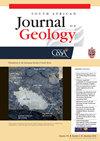A proposed chronostratigraphic framework for the late Quaternary of southern Africa
IF 1.2
4区 地球科学
Q2 GEOLOGY
引用次数: 4
Abstract
The principles of chronostratigraphy can inform the process of correlation between different palaeoclimate records, enabling the coherence of spatial and temporal patterns of past climates and environments to be identified based on the physical, chemical, biological and isotopic properties of individual depositional units. This study presents a chronostratigraphic framework for the late Quaternary of southern Africa, based on the integration of palaeoclimatic and palaeoenvironmental proxy data from key records across the country from the start of Marine Isotope Stage 6 (~191 ka BP) to present. The methodology adopted in this study involves, first, wiggle-matching between sufficiently long and continuous records from different regions across southern Africa, informed by radiometric age controls from individual records. Based on interpretive limitations of these records, we then integrate different geomorphic and archaeological data types in proposing successive chronostratigraphic time periods that collectively extend through the late Quaternary of southern Africa. These time periods correspond to phases in which, within them, a certain set of (relative) stable climates or environments existed in different regions of southern Africa, as recorded in different ways in different proxy records. The boundaries between successive time periods are identified where there is evidence for a significant change in the workings of the climate or environmental system as reflected in the preserved proxy record found in a certain locality. These chronostratigraphic units are interpreted as reflecting the impacts of external forcing that is of regional extent, synchronous, and are not merely an outcome of local environmental variability. These chronostratigraphic phases identified for the late Quaternary period also correspond to distinctive technological and cultural phases in the southern African archaeological record, demonstrating links between coeval climate and environmental change and phases of human evolutionary development. This chronostratigraphic approach provides both a correlative framework for understanding the varied late Quaternary records of southern Africa, and a testable hypothesis for considering the synchroneity or otherwise of different records and thus their associated forcing factors.非洲南部晚第四纪的年代地层格架
时间地层学原理可以为不同古气候记录之间的对比过程提供信息,从而能够根据单个沉积单元的物理、化学、生物和同位素特性来确定过去气候和环境的空间和时间模式的一致性。本研究基于从海洋同位素第6阶段(~191 ka BP)开始至今全国主要记录的古气候和古环境代用数据,提出了南部非洲晚第四纪的年代地层框架。这项研究中采用的方法首先涉及来自南部非洲不同地区的足够长和连续的记录之间的摆动匹配,这是由单个记录的辐射年龄控制决定的。基于这些记录的解释限制,我们整合了不同的地貌和考古数据类型,提出了连续的年代地层时间段,这些时间段共同延伸到非洲南部第四纪晚期。这些时间段对应于南部非洲不同地区存在某种(相对)稳定气候或环境的阶段,这些阶段以不同的方式记录在不同的代理记录中。连续时间段之间的边界是在有证据表明气候或环境系统的工作发生重大变化的情况下确定的,这反映在某个地区发现的保存的代理记录中。这些年代地层单位被解释为反映了区域性、同步的外力影响,而不仅仅是当地环境变化的结果。这些第四纪晚期的年代地层阶段也与南部非洲考古记录中独特的技术和文化阶段相对应,表明了同时代气候和环境变化与人类进化发展阶段之间的联系。这种年代地层学方法为理解南部非洲晚第四纪的各种记录提供了一个相关的框架,也为考虑不同记录的同步性或其他方面及其相关的强迫因素提供了一种可检验的假设。
本文章由计算机程序翻译,如有差异,请以英文原文为准。
求助全文
约1分钟内获得全文
求助全文
来源期刊
CiteScore
3.60
自引率
5.60%
发文量
18
审稿时长
>12 weeks
期刊介绍:
The South African Journal of Geology publishes scientific papers, notes, stratigraphic descriptions and discussions in the broadly defined fields of geoscience that are related directly or indirectly to the geology of Africa. Contributions relevant to former supercontinental entities such as Gondwana and Rodinia are also welcome as are topical studies on any geoscience-related discipline. Review papers are welcome as long as they represent original, new syntheses. Special issues are also encouraged but terms for these must be negotiated with the Editors.

 求助内容:
求助内容: 应助结果提醒方式:
应助结果提醒方式:


